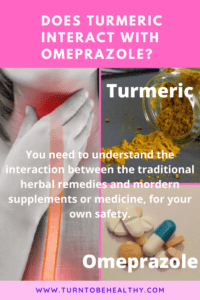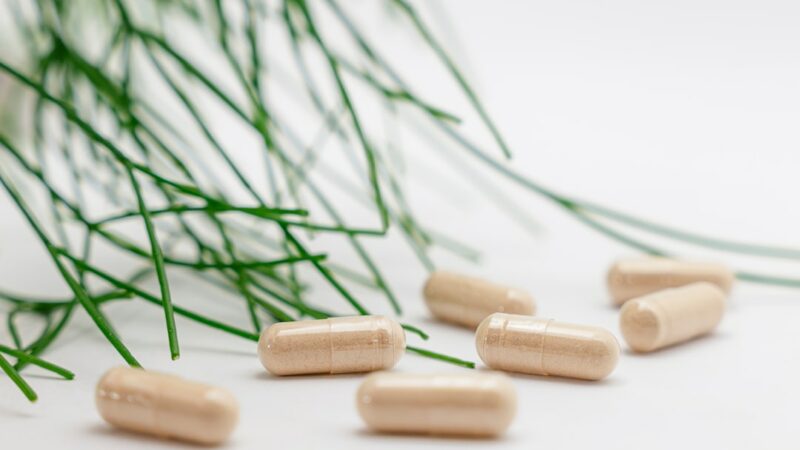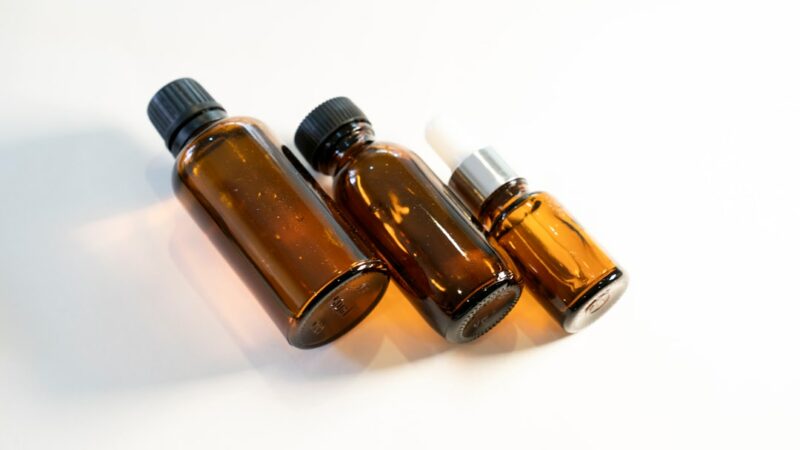Can You Take Omeprazole and Turmeric Together – Recommended dose, interactions, and precautions

An important question is can you take Omeprazole and Turmeric together? Learn how to safely take Omeprazole and Turmeric together, Omeprazole and Turmeric interactions, and Omeprazole and Turmeric precautions.
Omeprazole is an anti-ulcer medication used to treat stomach acid reflux disease, heartburn, and ulcers. Turmeric contains anti-inflammatory properties that can reduce inflammation of the gastrointestinal tract. However, caution should be taken when combining these medications.
Table of Contents
Can you take Omeprazole and Turmeric together?

A short answer is no; you cannot take Omeprazole and Turmeric together or simultaneously. It would be best to consider a few things before taking the two together simultaneously.
You can take them at different intervals depending on your body’s reaction. A consultation with your medical doctor, nutritionist, or dietician needs to be done first. Based on your body’s response to each of the two and those results.
They will inform you if it is good for you or not before taking them together. Other people’s body doesn’t even tolerate each or both of them. They are therefore required to use alternative medications. Turmeric naturally normalizes stomach acid.
Turmeric sometimes increases the production of stomach acid when taken with antacids like omeprazole. Omeprazole and turmeric prevent ulcers, stop gastric emptying, and reduce acid reflux. Omeprazole helps treat drug-resistant heartburn with PPIs.
However, when taking Omeprazole and Turmeric together sometimes causes unwanted reactions. That is why it’s essential to consult your medical doctor first before taking the two together.
When curcumin was administered before ranitidine, there were compensatory effects. The results suggest that mucoadhesion could be the mechanism for wound and gastric ulcer healing. The combinations with bismuth subsalicylate showed an additive effect in both cases, indicating no pharmacologic interaction.
That is why most medical professionals and nutritionists advise that if Turmeric and Omeprazole are taken together, the former may interfere with the action of the latter one. To avoid the interaction, you must take Turmeric and Omeprazole separately with a time interval of at least 3-4 hours.
The primary reason for the possible interference caused by turmeric in the action of omeprazole could be the action of curcumin. Several significant reports have reported the likely chances of interaction between Turmeric and Omeprazole. So, it is best to avoid taking Turmeric and Omeprazole together.
To ease stomach problems, you can take omeprazole (the main ingredient in Prilosec) and turmeric. Omeprazole is one of the most popular medications for stomach issues, so it’s safe to say that the two work well together.
To know if you should take Omeprazole and Turmeric together, make sure that you’re not allergic or sensitive to them before trying this combination out.

Does Turmeric Interact with Omeprazole?
Yes, Turmeric does interact with Omeprazole. Omeprazole can interact with other nutritional supplements, medicines, or herbal products that you may be about to take or take.
The interactions between herbal supplements and conventional drugs, a pharmacological study is critical because ingesting traditional herbal supplements as supplements or alternative medicine is relatively common worldwide.
Their concomitant administration with prescribed drugs could either have a favorable or unfavorable effect, depending on their impact on your body.
How does turmeric interact with the Stomach Acid Production Reducing Drugs (Omeprazole)?
Turmeric usually enhances your Stomach Acid Production, Reducing drugs’ effects such as omeprazole. When you take Turmeric and Omeprazole together, turmeric enhances the impact of omeprazole beyond specific actions, resulting in stomach acid production below the standard limit.
In this situation, omeprazole can negatively affect your health and digestive system instead of promoting ulcer healing.
Effects of Turmeric
Medications that interact with Turmeric
Turmeric supplements might cause dangerous interactions with various medicines, thus treating your health. It is essential to get medical advice from a healthcare professional before taking turmeric supplements if you are taking any of these medications.
One big issue is a drug interaction. Taking this supplement increases the drug interaction of the supplement. Some common medications that can interact with turmeric supplements include:
- Anxiety medication
- Amiodarone (Cordarone)
- Amiodarone (Cordarone)
- Acetaminophen (Tylenol)
- Blood thinners
- Chemotherapy drugs
- Diabetes medications
- Epilepsy medication
- Fluconazole (Diflucan)
- Fluconazole (Diflucan)
- Heparin (Lovenox)
- Ibuprofen (Advil, Motrin)
- Immune suppression
- Metoprolol (Lopressor)
- Omeprazole
- Pantoprazole (Protonix)
- Sildenafil (Viagra)
- Viral infections
- Warfarin (Coumadin)
The medicine interactions can modify the form of treatment that interacts with your body. The drug interaction may lower or increase the effects of the medication, and it may even lead to further harmful consequences. Curcumin, a compound in turmeric, may also interact with the above medicine important for your health.
Medicine interactions can cause dangerous side effects, even fatality. It is essential to be aware of all the potential risks before taking turmeric supplements.
Note: Turmeric can help lower blood pressure, which Omeprazole helps raise, so it’s possible that taking these two together could cause more risks than benefits.
Health Medicine That the Interactions of Curcumin Can hinder the following:
- Blood thinners – Curcumins may increase the activity of blood thinners, leading to excessive bleeding.
- Diabetes medications – Curcumins may decrease blood sugar levels, making diabetes medications less effective.
- Chemotherapy drugs – Curcumins may enhance the effects of chemotherapy drugs, increasing the risk for toxicity and side effects.
- Anxiety medications – Curcumins may increase the effects of anxiety medications, leading to increased anxiety.
- Heart problems – Curcumins may aggravate heart problems by decreasing heart function or increasing fluid retention.
- Immune suppression medications – Curcumins may decrease the effectiveness of immune suppression medications, leaving you susceptible to infection.
- Viral infections – Curcumins may decrease the effectiveness of antiviral medications, leaving you susceptible to viral infection.
- Epilepsy medications – Curcumins may decrease the effectiveness of epilepsy medications, leading to uncontrolled seizures.
- Pain medications – Curcumins may increase the effects of pain medications, leading to an increased risk of side effects.
- Surgery medications – Curcumins may increase the risk of bleeding during and after surgery.
If you take any of these medications, getting medical advice from a healthcare professional before taking turmeric supplements is crucial. It is also essential to be aware of the potential risks associated with taking curcumin supplements. Always consult with your doctor before starting any new supplement!
Blood Thinners Medication
Curcuma longa may interact with blood-thinning medications, such as warfarin (Coumadin). Taking turmeric might decrease how well the body gets rid of warfarin. An increase in the effects and side effects of warfarin might be possible.
Medications that slow blood clotting include:
- Aspirin
- Clopidogrel (Plavix)
- Diclofenac (Voltaren, Cataflam, others)
Turmeric might slow blood from clotting, thus assisting with blood flow. Taking turmeric and medications that slow clotting might increase the chances of bruising and bleeding.
Blood Clotting medications
Curcuma longa also is known to suppress blood clotting. When combined with medications that suppress clotting, the risk for bleeding can be increased.
Medications for Lowering High Blood Pressure
Turmeric may slow down the liver’s metabolism of some medicines. Taking turmeric and some drugs used for lowering high blood pressure might reduce the effects of these medications. Some of these medications used for lowering high blood pressure include:
- Captopril (Capoten)
- Enalapril (Vasotec)
- Losartan (Cozaar)
- Valsartan (Diovan)
- Diltiazem (Cardizem)
- Amlodipine (Norvasc)
Medications for Diabetes
Turmeric might decrease blood sugar. Taking turmeric and drugs for diabetes might cause your blood sugar to go too low. Monitor your blood sugar levels closely. If you’re taking diabetes medicine, your dose might need to be adjusted. If you’re taking diabetes medicine, your dose might need to be changed.
Some medications used for diabetes include:
- Glimepiride (Amaryl)
- Glyburide (DiaBeta, Glynase PresTab, Micronase)
- Insulin
- Pioglitazone (Actos)
- Rosiglitazone (Avandia)
- Chlorpropamide (Diabinese)
- Glipizide (Glucotrol)
- Tolbutamide (Orinase)
Medications that Lower Cholesterol
Turmeric can increase how much bile your body makes. Taking large amounts of turmeric might decrease how well the body gets rid of cholesterol. This supplement could cause problems for people taking medications that lower cholesterol.
Some cholesterol-lowering medications include:
- Atorvastatin (Lipitor)
- Lovastatin (Mevacor)
- Pitch (Advicor)
- Simvastatin (Zocor)
Medications for indigestion
Turmeric can increase bile production. Taking large amounts of turmeric while taking indigestion medications might increase the production of stomach acid and cause indigestion or heartburn. Some indigestion medications include:
- Cimetidine (Tagamet HB)
- Ranitidine (Zantac 75)
- Nizatidine (Axid AR)
- Famotidine (Pepcid AC)
- Omeprazole (Prilosec)
Medications for Depression
The active chemical in turmeric, curcumin, can boost the level of serotonin in the brain. Taking large amounts of turmeric while taking medications for depression might increase the effects of these medications. Some medications for depression include:
- Amitriptyline (Elavil)
- Doxepin (Sinequan)
- Imipramine (Tofranil)
Non-steroidal anti-inflammatory drugs (NSAIDs) or Pain Drug
Turmeric can increase the production of stomach acid. Taking turmeric and some medications for pain might increase the amount of acid in the stomach and cause an upset stomach or heartburn. Some NSAIDs include:
- Ibuprofen (Advil, Motrin, Nuprin, others)
- Indomethacin (Indocin)
- Ketoprofen (Orudis KT, Oruvail)
- Naproxen (Aleve, Anaprox, Naprelan, Naprosyn)
- Piroxicam (Feldene)
When taking any of the above drugs, don’t exceed the dosage. Doing so might cause too many of these medications and severe side effects in your body.
Daily Diet and Lifestyle
In addition to medications, there are some things you can do to help manage your conditions. Some helpful tips include:
Follow a healthy diet that includes plenty of fruits and vegetables.
- Exercise regularly.
- Reduce stress in your life.
- Get enough sleep every night.
- Quit smoking if you are a smoker.
These tips can help you feel better overall and make it easier to manage your conditions. Speak to your health care provider for additional information about the best way to work your health.
Acetylsalicylic acid (aspirin)
There is a concern that turmeric might increase the risk of bleeding when taken with medications that increase the risk of bleeding. Some of these medications include:
- Aspirin
- Anticoagulants (blood thinners) such as warfarin (Coumadin)
- Heparin
- Antiplatelet drugs such as clopidogrel (Plavix).
By increasing the risk of bleeding, these medications might make hemorrhage (bleeding) after surgery more likely.
Clopidogrel (Plavix)
There is a concern that turmeric might increase the risk of bleeding when taken with medications that increase the risk of bleeding. Some of these medications include:
- Aspirin
- Anticoagulants (blood thinners) such as warfarin (Coumadin)
- Heparin
- Antiplatelet drugs such as clopidogrel (Plavix)
By increasing the risk of bleeding, these medications might make hemorrhage (bleeding) after surgery more likely.
Non-steroidal Anti-inflammatory Drugs (NSAIDs)
There is a concern that turmeric might increase the risk of bleeding when taken with medications that increase the risk of bleeding. Some of these medications include:
- Aspirin
- Anticoagulants (blood thinners) such as warfarin (Coumadin)
- Heparin
- Antiplatelet drugs such as clopidogrel (Plavix)
By increasing the risk of bleeding, these medications might make hemorrhage (bleeding) after surgery more likely.
Warfarin (Coumadin)
There is a concern that turmeric might increase the risk of bleeding when taken with medications that increase the risk of bleeding. Some of these medications include:
- Aspirin
- Anticoagulants (blood thinners) such as warfarin (Coumadin)
- Heparin
- Antiplatelet drugs such as clopidogrel (Plavix)
By increasing the risk of bleeding, these medications might make hemorrhage (bleeding) after surgery more likely.
Interactions with Herbs and Dietary Supplements
Turmeric might increase the production of stomach acid. Taking turmeric and herbs and supplements that grow stomach acid might cause too much acid in the stomach and lead to heartburn, nausea, vomiting, and other side effects.
Anticoagulant Drug
Turmeric might increase the production of stomach acid. Taking turmeric and anticoagulant drugs might increase the risk of bruising and bleeding.
Antiplatelet Drug
Turmeric might increase the production of stomach acid. Taking turmeric and antiplatelet drugs might increase the risk of bruising and bleeding. Medications that Slow Blood Clotting (Anticoagulant / Antiplatelet Drugs).
Turmeric might increase the production of stomach acid. Taking turmeric and medications that slow blood clotting might increase the risk of bruising and bleeding.
Heparin
Turmeric might increase the production of stomach acid. Taking turmeric along with heparin might increase the risk of bleeding. Herbal Supplements That Can Cause Bleeding
Turmeric might increase the production of stomach acid. Taking turmeric and any herbal supplements that can cause bleeding might increase the risk of bleeding.
Medicine and Your Health
It’s critical to adhere to the prescribed dose and interactions when taking omeprazole and turmeric together. Taking too much of either of these medications might cause unwanted side effects.
Studies About The Risk of Taking Omeprazole and Turmeric Together
According to NCBI, the subsequent clinical trials we conducted and here are the results:
- They gave 500 mg of curcumin with 5 mg of piperine or placebo to 20 patients with tropical pancreatitis for six weeks, and they investigated the effects on pain pattern and RBC levels of MDA and GSH. After curcumin treatment, the researchers found a significant decrease in erythrocyte MDA levels compared to the placebo group, with a substantial increase in GSH levels. However, curcumin treatment did not help with the pain. According to the study, oral curcumin with piperine may aid in lowering lipid peroxidation in those with tropical pancreatitis.
- Participants were assigned to take a supplement containing isoflavones and curcumin or a placebo every day. Participants were divided into two groups based on their baseline PSA value at ten ng/ml. For this study, 100 mg of curcumin and 40 mg of isoflavones were combined for 43 persons, while a placebo was given to 42 individuals for six months. Before and after treatment, they measured PSA levels in all participants. Patients who received isoflavone- and curcumin-containing supplements had lower PSA levels, with values exceeding ten ng/ml among those who took the treatment. Isoflavones and curcumin were shown to affect serum PSA levels in this study. This research said that curcumin presumably works together with isoflavones to reduce PSA production.
- A study evaluated the effects of alcoholic extracts of turmeric oil and turmeric oleoresin on the number of micronuclei in healthy people and individuals with submucous fibrosis. The researchers observed no differences in the number of micronuclei in lymphocytes from healthy volunteers. On the other hand, the three extracts protected benzo[a]pyrene-induced an increase in micronuclei in circulating leukocytes. Turmeric oil (600 mg) plus turmeric (3 g), turmeric oleoresin (600 mg) plus turmeric (3 g), or turmeric alone were tested on patients with submucous fibrosis in another trial for three months. All three treatment strategies decreased the number of micronucleated cells in both exfoliated oral mucosal cells and circulating lymphocytes. On the other hand, turmeric oleoresin was more effective than berberine in reducing the number of micronuclei in oral mucosal cells. The study revealed that turmeric extract might potentially prevent micronuclei development in patients with oral pre-cancerous conditions.
- A recent study investigated the impact of curcumin on p38 mitogen-activated protein kinase (p38 MAPK), IL-1β, IL-10, and matrix metalloproteinase-3 (MMP-3) in the intestines of young people with IBD. Children and adults with active IBD were studied to see if curcumin would affect insulin-like growth factor (IGF)-1 expression in the colonic mucosa. Colonic myofibroblasts from children and adults with active IBD were cultured ex vivo with curcumin. In this study, curcumin was found to inhibit p38 MAPK activation, IL-1β production, and IL-10 production in mucosal biopsies. Furthermore, after treatment with curcumin, it suppressed MMP-3 expression dose-dependently in colonic myofibroblasts.
Medications that interact with Omeprazole
- Blood-thinning
- Fungal or yeast infections
- Anxiety
- Heart problems
- Immune suppression
- Viral infections
- Epilepsy
The interactions of medicines can modify the form of treatment that interacts with your body. The interactions may lower or increase the effects of the medication, and it may even lead to further harmful consequences.
Turmeric contains curcumin, which has properties that can help decrease inflammation and reduce symptoms of arthritis and psoriasis. For centuries, it has been used in Chinese and Indian traditional medicines to treat many health conditions, including cancer, arthritis, heart disease, diabetes, Alzheimer’s disease, and other medical conditions.
Omeprazole belongs to a group of medicines called proton pump inhibitors. It treats many symptoms like heartburn, ulcers, and gastroesophageal reflux disease (GERD).
What is Turmeric?
Turmeric is known as a spice used in Asian and Indian cooking. This ginger family is a rhizomatous herbaceous perennial plant (Curcuma longa). Turmeric contains curcumin (turmeric extract), which has properties that can help decrease inflammation and reduce symptoms of arthritis and psoriasis. For centuries, it has been taken as herbal medicine in India and some other countries across Asia to treat many health conditions, including:
- Cancer
- Arthritis
- Heart disease
- Diabetes
- Alzheimer’s disease
- And other medical conditions
Recently it has received significant interest from both worlds of medical/scientific, including the culinary world. The medicinal properties of Turmeric, which is the source of curcumin, have been understood for thousands of years; nonetheless, the knowledge to specify the exact mechanism(s) of action and determine the bioactive components have only recently been investigated.
Turmeric has been shown to have antioxidant properties that may assist the prevention of Alzheimer’s disease and other forms of dementia.
Omeprazole belongs to a group of medicines called proton pump inhibitors. It treats many symptoms like heartburn, ulcers, liver disease, and gastroesophageal reflux disease (GERD).
This plant has been shown to have antioxidant properties that may assist the prevention of Alzheimer’s disease and other forms of dementia.
Many of these natural product extracts have pharmacological or biological activities that you can use for drug discovery and drug design purposes to help elevate human health.
Plants have been used for medicinal purposes, like curry powder, etc., throughout history, both ancient and modern, and they continue to play an essential role in medicine today.
Is Turmeric an Anti-Ulcer Agent?
According to animal and human studies reports, Turmeric may be potentially an anti-ulcer agent. So if you take Turmeric and Omeprazole together, Turmeric may enhance the effect of this gastroprotective drug.
Turmeric as an Anti-ulcer agent; from a research perspective
In a recent research study, Turmeric has shown strong gastric acid-reducing properties and enhanced gastric mucus production (protective biomaterial of the gastrointestinal cavity). Turmeric was also found to inhibit pepsin’s activity. The study participants reported a significant improvement in their gastric ulcer healing after consuming turmeric dosages for two consecutive weeks.
In 2011, researchers compared the activity and action of Turmeric and Omeprazole in a research study. The results were astonishing as Turmeric has shown more potency than Omeprazole. Curcumin (the active ingredient of Turmeric) was very effective in preventing gastric lesions’ formation. That was significant proof of the solid anti-ulcer activity of Turmeric.
How To Take Turmeric for inflammation
The recommended dose starts mostly between 400-600 mg per day (divided into three doses), but dosages vary depending on your symptoms and other factors like age or physical condition.
Turmeric’s benefits are not limited to just boosting the immune system and reducing joint pain. It also has anti-inflammatory properties, which usually show within a few hours of taking it, which sometimes takes less than that.
You can increase the doses if your body doesn’t react negatively to the Turmeric. You can go all the way to 4000-8000 mg per day (divided into three doses). The amounts you take must not exceed 12,000 mg/day of 95% concentration of the following three curcuminoids without consulting your medical doctor:
- curcumin
- Demethoxycurcumin
- Bisdemethoxycurcumin
It is essential to take note of the concentration of your Turmeric because if you take a too high concentration, you need to take a less amount to prevent adverse effects. If you take a too low concentration, you need to take a high amount to see results.
Take note that one teaspoon of turmeric powder or one teaspoon of ground turmeric is approximately 5000 mg.
What is Omeprazole?
Omeprazole is a prescribed medicinal compound that reduces gastric acid production by working as a proton pump inhibitor. When gastric acid production decreases, the risk of gastric ulceration also reduces. Omeprazole is also helpful in the treatment and healing of already present ulcers. It is used as an over-the-counter pill. Commonly, doctors prescribe it for various digestive system-related disorders such as:
- Peptic ulcers
- Esophagitis
- GERD Disease
- Gastroesophageal reflux disease
- Zollinger–Ellison syndrome.
It works by blocking the production and action of stomach acid in the body. Omeprazole also inhibits a chemical the secretion of TCTP, which is linked to the consequence of the body’s allergic reaction.
How does omeprazole work?
Omeprazole works by binding to and inhibiting the H+/K+ ATPase enzyme located on the parietal cells in your stomach. This enzyme is responsible for secreting HCl, which is required for breaking down food in your stomach. When omeprazole inhibits this protein, less HCl is secreted into your stomach, and as a result, you experience less heartburn and other symptoms associated with GERD.
Omeprazole dosage for Adults
The form of taking Omeprazole is mainly dependent on the diagnosis of your medical condition, your medical doctor’s recommendation, and the patient’s preference.
- The scientific recommendation for oral dose to cure symptomatic GERD absent esophageal lesions is mostly 20 mg daily for four weeks. Nonetheless, if erosive lesions are present, Omeprazole may extend treatment to eight weeks.
- Patients with hypersecretory disorders start the treatment from 60 mg once daily. The treatment is followed by individualizing dosage based on the patient’s requirement and clinical response. If the daily quantity is higher than 80 mg, they should separate the dosage throughout the day. Omeprazole is not recommended for long-term treatment. Instead, switching to an H2-inhibitor is much preferred.
The dosage depends on the child’s weight for pediatric patients between the ages of 1 and 16.
- A weight that is between 5 to 10 kg: must take 5 mg daily
- A weight that is between 10 to 20 kg: must take 10 mg daily
- A weight that is more than 20 kg: must take 20 mg daily
Patients Should Take Omeprazole Before or After Meal?
Patients should take Omeprazole at least 30 to 60 minutes before any meal.
You may ingest it with antacids. The first dose is before breakfast and the second before dinner when taken twice daily.
The tablet and capsule should be swallowed as a whole, not to be chewed or crushed. Nonetheless, it is permitted to open the capsule and mix the contents with one tablespoon of applesauce. Until it can be soft enough to be swallowed without chewing, the suspension should be left to thicken for about two to three minutes, following reconstitution and administration within 30 minutes. You can drink with a glass of cool water to confirm the complete swallowing of the pellets.
Treatment Using Omeprazole
The scientific recommendation for oral dose to cure symptomatic GERD absent esophageal lesions is mostly 20 mg daily for four weeks. Nonetheless, omeprazole may extend treatment to eight weeks if erosive lesions are present.
Patients with hypersecretory disorders start the treatment from 60 mg once daily. The treatment is followed by individualizing dosage based on the patient’s requirement and clinical response. If the daily quantity is higher than 80 mg, they should separate the dosage throughout the day. Omeprazole is not recommended for long-term treatment. Instead, switching to an H2-inhibitor is much preferred.
Precautions should you take while taking Turmeric with Omeprazole

Many people who take Turmeric and Omeprazole are unaware that the two substances may react. There is an increased risk of drug resistance or toxic effect of antiretroviral medicines when using Omeprazole.
Omeprazole is assumed as a benign drug; nonetheless, the main adverse results reported in medication labeling include the following:
- Headache
- Abdominal pain
- Nausea
- Diarrhea
- Vomiting
- Flatulence in adults
Long-term and multiple daily dose PPI treatment may have connections with an increased risk for osteoporosis-related fractures of the hip, wrist, or spine. However, newer studies show that long-term PPI use does not correlate with bone mineral density or bone strength changes that would predispose to increased fracture risk, suggesting this relationship is not casual.
Turmeric is considered a blood thinner and shouldn’t be taken together with blood-thinning medications because you might find your blood becoming too thin and weak, which will lead to internal bleeding, nose bleeding, etc.
Scientists encourage diabetes patients not to use Turmeric because it can lower the blood sugar to a too low level. It is best to consult your medical doctor before taking the two medications together.
Curcumin can inhibit the antitumor activity of chemotherapeutics; its use during chemotherapy should only be done under medical supervision. Similarly, vigilance is a must in patients allergic to Turmeric or any of its constituents. Patients allergic to Turmeric should pay equal attention to patients with blood coagulation disorders or under anticoagulants treatment. In these cases, dose adjustments are needed, while patients going for chemotherapy should stop curcumin use in scheduled surgery. Finally, you should apply Turmeric with caution in individuals with diabetes or hypoglycemia or when treated with drugs that lower blood glucose levels.
Turmeric is a natural herb used mainly for inflammation, digestion, joint pains, etc.
Omeprazole is a medication that prevents stomach acid from coming up into the esophagus, managing and treating several conditions, including peptic ulcer disease, etc.
It has been found out through some studies that taking both Turmeric and Omeprazole together can make the absorption of this drug less effective. The best way to prevent this chemical reaction is by taking these two medicines at different times of the day.
Turmeric and curcumin seem to be safely and highly accepted without toxic effects, even in high doses. Moreover, epidemiological data have displayed a few kinds of cancer incidences in individuals who regularly consume curcumin (Aggarwal and Sung, 2009). Nonetheless, the safety of curcumin should be additionally studied, and long-term studies are required for a more helpful evaluation of likely adverse effects and to ultimately determine its harmful possibility.
Benefits of Turmeric
It is a spice long associated with medicinal properties has drawn attention from both the medical/scientific community and foodies because it is the primary source of polyphenol curcumin.
Advantages of taking Turmeric
It can help with the management of the following:
- Oxidative and inflammatory illnesses
- Preventing cancer
- Metabolic syndrome
- Rheumatoid arthritis
- Anxiety
- Hyperlipidemia
Turmeric helps manage oxidative and inflammatory disorders such as:
- Joint Pain
- Muscle soreness
- Hyperlipidemia
- Alzheimer disease
It may also aid in managing exercise-induced inflammation and soreness, which can enhance athlete recovery and performance. There are more health benefits of turmeric, and the scientific research study is at an infant stage in understanding it.
You can read more about Turmeric on the following topics:
- What are the top 10 best turmeric shots for inflammation?
- What is the best turmeric supplement for inflammation? | Top 10
- PuraThrive Curcumin Gold Reviews
Disadvantages of taking Turmeric
The disadvantage of taking Turmeric is that some people may have mild side effects such as:
- Gastrointestinal issues
- Acid reflux
- Diarrhea
- Headache
- Dizziness
- Rash
- Yellow stool
Advantages of taking Omeprazole
PPIs strongly inhibit gastric acid secretion, especially during the daytime after a single daily dose in the morning. Acid suppression is provided orally gradually during the first 3–5 days after starting the drug. PPIs are not tolerable, even after long-term treatment. These characteristics of PPIs can be considered beneficial for the long-term control of gastric acid secretion.
Long-term inhibition of gastric acid secretion is necessary for the maintenance treatment of GERD and the prevention of peptic ulcers with aspirin or NSAID use. Because the acid-suppressing effects of a single dose of PPIs in the morning remain potent during the daytime, PPIs are reported to be effective for preventing recurrence of reflux symptoms and esophageal ulceration/erosion. 19–21 With continued use, GERD recurrence with 1-year maintenance treatment is reported to be less than 15%, while 1-year recurrence without maintenance treatment is estimated to be more than 50%. 24.25 When comparing the preventive effect of PPIs on GERD recurrence with H2RA, PPIs were found to be much more effective.
Long-term administration may also be adequate to prevent the neoplastic conversion of Barrett’s esophagus to dysplastic Barrett’s esophagus, such as adenocarcinoma. It has not been wholly determined whether PPIs effectively suppress dysplastic changes of Barrett’s esophagus. Long-term PPI use was also helpful for preventing recurrence of aspirin-induced peptic ulcers and was more effective than H2RA, with the recurrence rate falling to about 1/10 compared with the placebo-treated group. 23,27–29 Similarly, in cases where NSAIDs were used, PPIs were reported to reduce the recurrence rate to 1/10 compared with the placebo group over a follow-up period of 6 to 12 months.
Disadvantages of taking Omeprazole?
All clinical drugs, including PPIs, have both therapeutic and adverse effects. Most acid inhibition-related adverse effects are observed during long-term PPI treatment, whereas those unrelated to acid inhibition are kept in long-term and short-term PPI users. Some people might experience some of the following:
- Abdominal pain
- Muscle spasms
- Headache
- Dementia
- Cerebral ischemic disease
- Ischemic cardiac disease
- Chronic kidney disease
- Acute interstitial nephritis
- Collagenous colitis
- Drug allergy
- Drug interaction with clopidogrel
Can you take Turmeric daily
Yes, but you can take Turmeric daily because it can help with several disorders, including inflammation, arthritis, joint pain, etc.
Take note that taking Turmeric on a daily schedule can also pose the following risks: an allergic reaction such as the following:
- Difficulty breathing
- Swelling of the mouth or throat
- Stomach upset such as:
- Nausea
- Diarrhea
- Constipation
- Rash
- Headache
- Ringing in the ears (tinnitus)
If you plan on taking Turmeric for a long time, you need to start with a minimum dose and not go to a maximum. You also need to consult your medical doctor once you reach four weeks of taking it.
Turmeric Supplements or Curcumin Supplements
Curcumin is a substance produced from turmeric, the most abundant natural polyphenol in the rhizome of Curcuma longa (turmeric) and many other Curcuma species. Due to its antioxidant, anti-inflammatory, antimutagenic, antimicrobial, and anticancer characteristics, Curcuma longa has been utilized in Asia as a medical herb.
Turmeric supplements usually include a concentrated form of curcuminoids. Curcuminoids are absent from turmeric spice in significant quantities, so you’d have to consume a lot of turmerics to get the same effects as from a curcumin supplement.
Like most medicine, curcumin supplements are available in tablets, capsules, and liquid forms.
Curcumin, while still functional, does not have the same health benefits when taken alone as it does when absorbed through oral ingestion due to its poor bioavailability. This low-cost spice, abundant throughout India, has prompted numerous scientists to look for new oral delivery methods.
Curcumin is effective against many illnesses when ingested directly under the tongue or topically applied as tinctures and ointments (often utilizing alcohol or glycerin). It has been demonstrated to have incredible therapeutic potential in combating various disorders.
Several factors may improve bioavailability. When curcumin is combined with piperine, the absorption of curcumin into the body is enhanced by 2000%. Curcumin combined with enhancing agents has several health advantages.
Evidence suggests that curcumin’s anti-diabetic effects are due to its ability to lower oxidative stress and inflammatory reactions. It can also be beneficial for people with diabetes. It lowers fasting blood sugar levels, glycated hemoglobin, and body mass index in those who have diabetes.
It may affect blood lipid profiles in patients at risk of cardiovascular disease. Like other medicaments with the same active ingredient, curcumin might be used as a well-tolerated dietary supplement to conventional medications.
The curcumin supplement (0.5% in diet) also reduces fasting blood sugar levels, urine sugar levels, and urine volume in STZ-induced diabetic rats. Dietary turmeric extract (0.5% in the diet, ethanol, and/or hexane extraction) for four weeks reduced blood sugar levels in KK-A(y) mice with type 2 diabetes.
Curcumin affects body weight and body mass index (BMI) but does not on waist circumference (WC).
Gastroesophageal reflux disease (GERD)
It is one of the most common disorders, and omeprazole is the first-line therapy for its management.
What are the Symptoms of GERD?
The most common symptoms of GERD are as follows:
- Heartburn
- Regurgitation
- Dysphagia
- Odynophagia
- Belching
- Epigastric pain
- Nausea
Your first action is to consult your medical doctor.
What are the side effects of Omeprazole
Omeprazole has the following side effects:
- Nausea
- Diarrhea
- Constipation
- Stomach pain
- Testosterone problems
- Bloody or cloudy urine
- Rash or blisters
- Headache
- Ringing in the ears (tinnitus)
The following conditions may worsen with a higher dose of Omeprazole:
- Heart failure
- Asthma
- Liver problems
You need to rush to your medical doctor if you urgently find yourself with these symptoms.
Stomach Pain
Most people usually experience stomach pain when they stop taking omeprazole. However, consult your doctor right away if you feel severe stomach pain.
PPIs strongly inhibit gastric acid secretion, especially during the daytime after a single daily dose in the morning. Acid suppression is provided orally gradually during the first 3–5 days after starting the drug.
PPIs are not tolerable, even after long-term treatment. These characteristics of PPIs can be considered beneficial for the long-term control of gastric acid secretion.
Long-term inhibition of gastric acid secretion is necessary for the maintenance treatment of GERD and the prevention of peptic ulcers with aspirin or NSAID use. Because the acid-suppressing effects
Safest Acid Reflux Medication Over-The-Counter
The FDA’s guide says there are three types of over-the-counter (OTC) medicines available to treat acid reflux or heartburn:
- Antacids
- Histamine-2 (H2) blockers
- Proton pump inhibitors (PPIs)
The stomach releases acid to digest food. But an excessive amount of acid can cause heartburn, peptic ulcers, and even erosion of the esophagus. Antacids help neutralize the excess stomach acid, which helps to reduce these symptoms.
Antacid is a medication that neutralizes excess stomach acid to relieve heartburn and other symptoms caused by indigestion. Antacids are available in both prescription-only and over-the-counter forms. The two main types of antacids are H2 blockers and proton pump inhibitors (PPIs).
H2 blockers work by decreasing the acid produced by the stomach’s parietal cells. This group includes cimetidine (Tagamet), Famotidine (Pepcid), Rizatriptan (Maxalt), and Ranitidine (Zantac).
Proton pump inhibitors are drugs that offer to reduce acid production in the stomach. They contribute to helping in treating various conditions ranging from:
- Gastroesophageal reflux disease
- Gastroenteritis
- Chronic gastrointestinal disorders.
How to use Omeprazole and Turmeric safely and effectively
- Please read the label to understand how to take it and all the precautions you must follow.
- Taking more than directed or using longer than directed on the label is not permitted, except when advised by your health practitioner.
- If your heartburn symptoms continue consistently after using these medications, you need to talk to a healthcare professional quickly.
Can you take Sucralfate and Omeprazole together
The general recommendation for these two medications is not to be taken together due to the risk of increased side effects from their interaction.
Patients should consider that even though the mix may ease their symptoms, it may also raise side effects that might lead to different complications.
The relationship between these medicines is not entirely known. Certain studies have found that Omeprazole is more effective than sucralfate when treating NSAID-induced Gastroduodenal ulcers.
How to take Turmeric as an Anti-Ulcer Agent
The recommended dose for ulcer treatment is usually between 200 mg – 800mg three times a day. The dosages vary depending on many factors, i.e., your symptoms severity and other factors like age or physical condition, etc.
They are many different ways to take your Turmeric, i.e.:
- With foods
- With water
- With smoothie
Most importantly, boiled and roasted curcuminoids improved cell viability, mitigated intracellular accumulation of reactive oxygen species, reduced malondialdehyde activity, reduced caspase-3 and caspase-9 protein expression, and increased superoxide dismutase activity in PC12 cells.
For people who have liver problems or gallstones, Turmeric can cause an increase in bile production, and they should not take Turmeric.
It is clear from studies on Turmeric as an anti-ulcer agent that it has been effective at treating ulcers caused by various factors such as Helicobacter Pylori infection, stomach acid secretion, and injury to stomach lining cells. In some cases, Turmeric seems to be more effective than standard antacids or proton pump inhibitors (PPI).
Can you take Pepcid and Omeprazole together
Yes, you can take Pepcid and Omeprazole together. Although there are not enough studies that show any interactions between the two, that doesn’t mean it is not happening.
It would be best to take them with caution or advice from your health practitioner.
Can you take Mebeverine and Omeprazole together
You can take Mebeverine and Omeprazole together, but not with other drugs like Nurofen, Panadol, or ibuprofen. It is in your best interest to follow the dosage instructions carefully. Mixing the two will cause an erythromycin overdose, leading to serious side effects like renal damage, gastrointestinal discomfort, or hepatic dysfunction.
Not everyone will have the same reaction, and it is always advisable to inform or discuss such information with a health practitioner.
Who should not take Turmeric
Turmeric has many benefits. Some of its uses are in cooking, medicinal purposes, and its anti-inflammatory properties. The active alkaloid in Turmeric is curcumin, and it can be unsafe if you have certain health conditions.
However, some people should not take it because it can cause problems. If you are not certain about whether you should take Turmeric, here is the list of people who should not take Turmeric:
- People with gallbladder issues
- People with diabetes
- People with liver problems
- People with gallstones or kidney stones
- Pregnant women
- Breastfeeding women
- People ready to go for a surgery
- People with weak blood or bleeding issues
- People allergic to curcumin
- People with low stomach acid levels
- People with an allergy to Turmeric
- People with Alzheimer disease
It would be best to consult your medical doctor before using the Turmeric herbal supplement.
What is the best time to take turmeric to get its maximum potency
The best time to take turmeric is after meals. However, according to the experts, taking turmeric before going to bed is the best way to get its maximum potency because it will have time to act in your body through the night. You can mix the turmeric in your food or take it with water or milk.
Conclusion
The information above is crucial for taking precautions while taking turmeric and omeprazole. Side effects that can occur when combining most medicines include an allergic reaction and interactions with other drugs that the person is taking.
When you take omeprazole and turmeric together, you should know the possible side effects and precautions. These include minor stomach discomfort, diarrhea, skin rash, pain in joints or muscles, indigestion, nausea, fatigue, and weakness.
Millions of Americans take prescription drugs daily without consulting their medical professional beforehand. We all know that it is imperative to speak with a doctor before taking any medication, but millions of us forget to do so, which can be life-threatening.










